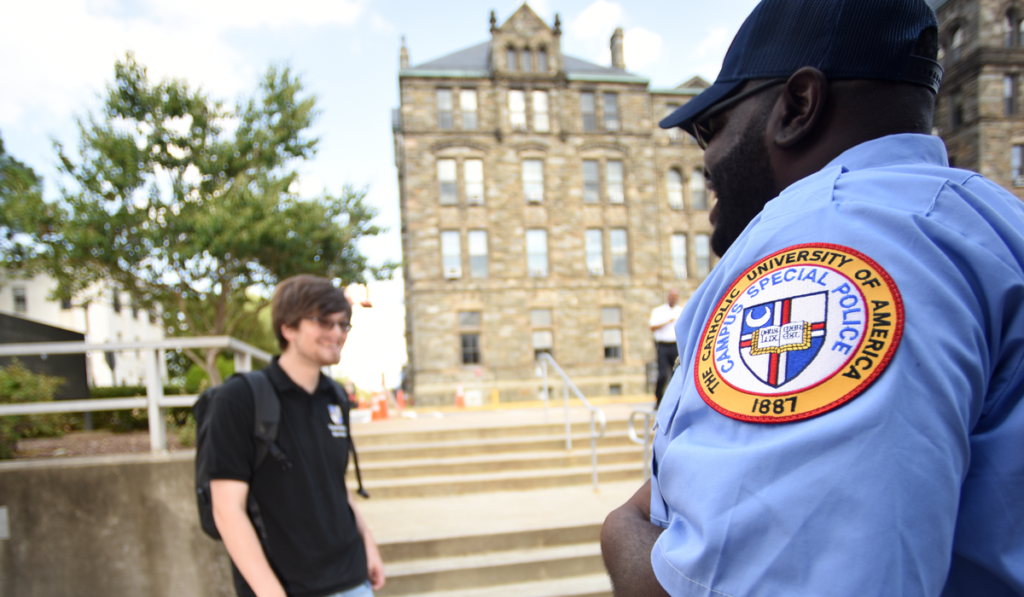Safety on CUA’s Campus

Courtesy of Department of Public Safety website
By Jacqueline Jedrych
A parent’s highest priority when sending their child to college is often their safety. Catholic University is located in the Brookland neighborhood, which received a C+ rating in crime and safety from Niche.com. The biggest on-campus resource for students’ safety is the Department of Public Safety (DPS).
“The Catholic University of America is committed to student safety as its highest priority,” according to the DPS website. Their goal is to maintain a safe campus environment that is “conducive to learning, working, living, and visiting.”
Catholic’s DPS sponsors services such as the Rape Aggressive Defense Program, Safety Escort Service, Public Safety Assistants who monitor residence halls, security patrol, safe escort and transportation, identification and access services, emergency alerts, and the Blue Light system throughout campus. It also has personal safety tips— how to stay safe in Residence Halls, after hours, on and off campus, and online— as well as how to keep your property, identity, and vehicle safe on its website.
DPS and Catholic University also abide by the Clery Act of Title IX. The Clery Act is a law aiming to provide transparency regarding campus crime policy and statistics. The 2018 Crime Statistics Report is available on the DPS website, where anyone can view past crime statistics. Over the last three years, the highest amount of incident reports occurred in 2016, with 466 liquor law violations referred for disciplinary action.
Catholic University also works in collaboration with the local police and has specially trained officers who patrol 24 hours a day at high-risk areas such as under the Taylor Street bridge and across from the Brookland Metro stop.
Although many resources are available, students have had varied experiences with DPS. Some students feel like DPS does not have much of an impact on actual crime prevention on campus.
“I think it is sometimes nice to see DPS out there,” said freshman politics major Cielo Marie Castro. “But I feel like they do nothing.”
The Student Government Association has worked to help DPS operate more effectively as well. “I have worked on reforming a wide variety of DPS related issues including the campus speed limit policy, opportunity theft, and the blue light system,” said Class of 2022 Senator and chair of Student Resources Committee, Gerald Sharpe. “I look forward to continuing to work on these issues with other members of the Senate as well as the entire student body.”
The volume of off campus students is another concern. Students who don’t live in residence halls find that they are not as well protected.
“As someone who works to advocate for sexual assault awareness, I believe that Catholic U students must function on a higher level of awareness as we live in a metropolitan area where we are fully integrated with D.C. as a whole; our campus is not secluded to itself,” said senior political science major Kelly Kirchgasser. “I do feel grateful to live on a campus where DPS is so present, but given the volume of students that live off-campus, I’d like to see more DPS surveillance in a few areas.”
In regards to on-campus needs, Catholic University has only one address, so it is often difficult to call 9-1-1 for on-campus situations, as they do not know the layout of the campus. Therefore, DPS is the most responsive to on-campus needs. However, some students feel like they could operate more effectively.
“Once there was a girl in my hallway throwing up blood and someone called DPS to help her,” said Castro. “They took a long time to get there and when they did, the officer just watched her for a while. I don’t know why they didn’t take her to the hospital right away. I don’t think they are bad, I just wish they were a little more efficient.”
Oftentimes, students are afraid to call DPS due to fear of retributory action. DPS and the Dean of Students offer medical amnesty, which exempts students who are committing a lesser infraction from being punished when they call for help for a friend. If a student is intoxicated when they call for help for a friend in medical distress, he will not receive disciplinary action but must agree to undergo educational and/or health interventions. Although this is often employed, some students do not trust medical amnesty to actually keep them safe from punishment.
DPS offers many resources for Catholic University students to use, but many students find them ineffectual or are too afraid to use them.








